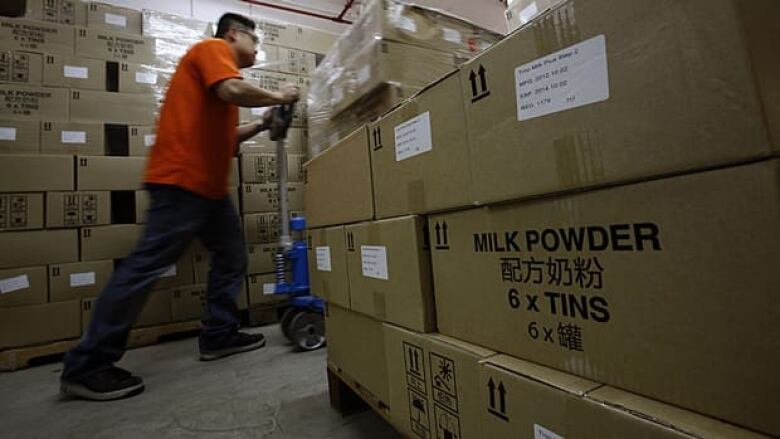Hong Kong formula crackdown aims to end 'baby hunger outbreak'
New measures, hotline, petition to Obama aim to stop parallel trade of formula in China

A Hong Kong hotline set up for parents to order milk formula was flooded with calls over the weekend, and other new measures introduced by the government to crack down on the product's parallel trade in mainland China are already working, according to officials.
Health Secretary Dr. Ko Wing-man said the hotline has had more than 3,800 calls since its launch on Friday, and the supply chain for the in-demand product will be monitored closely to ensure orders are filled before the Lunar New Year holiday begins on Sunday.
The hotline was one way the government decided to answer the call for action from frustrated parents who say cross-border shoppers are causing shortages and price increases for formula.
CBC in Hong Kong
Meagan Fitzpatrick has been posted to Hong Kong to bolster CBC's coverage of a dynamic region of the world.
Hong Kong is known as an international financial centre, but there is much more to it than that, and it has close connections to Canada. The city of seven million hosts nearly 300,000 Canadians, and about 500,000 people of Hong Kong descent make their home in Canada. Meagan is a senior online writer who covers national news and federal politics in CBC's Ottawa bureau.
Mainlanders flock to tax-free Hong Kong for several products, and baby formula is one of the hottest commodities. Some are buying it for themselves, while others are parallel traders who pack suitcases full of formula and resell it at home for a profit.
Demand for Hong Kong's baby formula started growing a few years ago following a tainted formula scandal in China that shook public confidence in products sold there.
Petition seeks Obama's help
The parallel trade of baby formula is causing a "baby hunger outbreak," according to more than 20,000 people who have signed a petition asking U.S. President Barack Obama to intervene. The petition, started last Tuesday on Obama's "We the People" website, was a new tactic for parents in Hong Kong who have been pressuring their own government to take some action.
The petition asking for Obama's help says the Hong Kong government is framing the matter as an issue of free trade and is neglecting to enforce existing smuggling laws. Evading duty on China's side of the border is illegal, but parallel trading itself is not.

The 24-hour hotline for parents to order formula from suppliers if they can't find one of seven major brands at a store is a temporary measure. On a permanent basis, the government also plans to introduce legislation later this month so that shoppers will need a permit to leave Hong Kong with formula.
The amount will also be limited to two cans per person, and children won't be allowed to take any across the border. There was also a pledge for enhanced inspections at border points to catch smugglers and new weight limits for luggage on trains took effect Monday.
The security secretary said Monday that there were fewer people in line than usual at the weight-check points and that good behaviour on trains reflected the effectiveness of the new measures. Lai Tung-kwok also said fewer people were buying the product in bulk at pharmacies and that the Immigration Department has denied entry to more than 600 people in the last few days who are on a parallel trader watch list.
Despite what the government says, the measures may not put an immediate stop to rising tensions. A day after the measures were announced, police and a man got in an argument at a subway station when they accused him of being a parallel trader, according to the South China Morning Post. The elderly man denied it and grew angry, and he was escorted away.
On Sunday, a group protested at the subway station, handing out leaflets that read, "Restore Hong Kong, give me back the milk powder," the paper reported.
Formula fight far-reaching
This baby food fight is about more than just the supply and price of milk formula. The South China Morning Post's editorial last week described it as a catalyst for growing resentment toward mainland residents.
"The mainland's food-quality issues are at the root of the problem. It will overcome them eventually as its rapidly developing economy matures. Then the attraction of Hong Kong supplies will fade," it said. "Meanwhile, antagonism directed at the mainland that fuels negative attitudes towards increasing integration is a sentiment the city can ill-afford for long."
One letter to the editor said the issue is polarizing people in Hong Kong, and he was worried violence would break out at the border if the governments on both sides don't do something soon.
A columnist in the paper, Albert Cheung, pointed out mainlanders aren't the only ones involved in parallel trading; locals are also doing it. Cheung said parallel trading is an important economic activity, and that Hong Kong thrives on free trade and an open economy. Straying from that with controls on baby formula would "risk making Hong Kong an international laughing stock," he wrote.